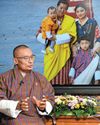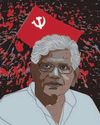
NEELU COULD EASILY belt out multiplication tables up to 26 when she was in class three. She had almost learned division, too. She was capable of reading and writing basic Hindi sentences and could also comprehend some English words. That was two years ago.
Now, Neelu, 10, a dalit girl from Nagla Shyam village, Bharatpur district, Rajasthan, is in class five. But, she can only recite tables up to nine. She can barely manage addition, and reads Hindi sentences with difficulty. Aman, her classmate, is even worse off—he only remembers tables up to eight and has completely forgotten how to read. “Neelu's and almost all her schoolmates' learning levels have reverted by four-five years during the past two years as lockdowns distanced them from education,” Suresh Sharma, principal, Nagla Shyam Primary School told THE WEEK.
About 750km away, in tribal-dominated Nogawa, Meghnagar block, Jhabua district, Madhya Pradesh, Nisha Dewal, 11, who was a class four student in 2019-2020, did not rejoin her school when it reopened in September 2021. She has forgotten everything she learned and her parents—both daily wage labourers—are unable to focus on her education as they struggle to care for their six children.
Siraj, 12, of Ghazipur settlement in East Delhi, dropped out of school during the lockdown because of the lack of access to online classes and the family income dwindling; his family is dependent on waste picking. He was found picking waste by volunteers of the Association for Social Justice and Research and was convinced to take classes at its child activity centre (CAC). But, Siraj remains out of school and continues to pick waste to support his family.
This story is from the {{IssueName}} edition of {{MagazineName}}.
Start your 7-day Magzter GOLD free trial to access thousands of curated premium stories, and 9,000+ magazines and newspapers.
Already a subscriber ? Sign In
This story is from the {{IssueName}} edition of {{MagazineName}}.
Start your 7-day Magzter GOLD free trial to access thousands of curated premium stories, and 9,000+ magazines and newspapers.
Already a subscriber? Sign In

Themes Of Choice
As Savvy Investors Seek New Avenues, Thematic Mutual Funds Are Gaining Popularity

A golden girl
One of India's most formidable beauties passed away earlier this month. The odd thing is she would absolutely hate this obituary; she hated being written about and avoided publicity for all of her nine decades. Indira Aswani was 93 when she died. But anyone who encountered her, even briefly, was in such awe of her grace and poise, and one could not but remember her forever.

The interest in wine is growing delightfully in India
The renowned British wine writer and television presenter Jancis Robinson, 74, recently came to Delhi and Mumbai to reacquaint herself with India's wine industry. This was the Robinson's fourth visit to India; the last one was seven years ago. On this trip, Robinson and her husband, restaurateur Nicholas Lander, were hosted by the Taj Hotels and Sonal Holland, India's only Master of Wine.

United in the states
Indian-Americans coming together under the Democratic umbrella could get Harris over the line in key battlegrounds

COVER DRIVE
Usage-driven motor insurance policies offer several benefits

GDP as the only measure of progress is illogical
Dasho Karma Ura, one of the world's leading happiness experts, has guided Bhutan's unique gross national happiness (GNH) project. He uses empirical data to show that money cannot buy happiness in all circumstances, rather it is family and health that have the strongest positive effect on happiness. Excerpts from an interview:

India is not a controlling big brother
Prime Minister Tshering Tobgay considers India a benevolent elder sibling as the \"big brotherly attitude\" is happily missing from bilateral ties. He thinks the relationship shared by the two countries has become a model of friendship not just for the region, but for the entire world. \"India's attitude is definitely not of a big brother who is controlling and does not allow the little brother to blossom and grow,\" says Tobgay in an exclusive interview with THE WEEK.

Comrade with no foes
Lal Salaam, Comrade Yechury-you were quite a guy!

Pinning down saffron
In her first political bout, Vinesh Phogat rides on the anti-BJP sentiment across Haryana

MAKE IN MANIPUR
Home-made rockets and weapons from across the border are escalating the conflict